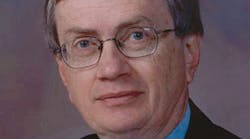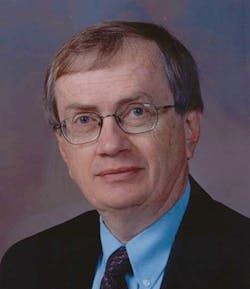An avid reader, Tom Marlin can often be found with Kindle in hand, soaking up new ideas and new perspectives to share.
When I dialed up Tom Marlin to share with him the news of his induction into the Control Process Automation Hall of Fame, three things struck me most in the course of my conversation with the McMaster University emeritus professor.
First, was a conviction that knowledge and ideas have the power to change the world for the better. Second, that such knowledge and ideas should be shared freely and not limited to those accustomed to power and privilege. And third, Marlin believes in the power of preparedness to make one ready to leap at life’s opportunities when they come your way.
Such was the case in the late 1980s, when he led a yearlong study of the potential benefits of industrial automation in Australia. A native of the northeastern U.S., the PhD chemical engineer had worked at Exxon, and had just left engineering firm Stone & Webster, rather than move to its new process industry headquarters in Houston. “It’s not something I planned for, but somebody invited me to put in a letter of intent, and they chose me.”
This year, we welcome five new members to the Control Process Automation Hall of Fame.
- Thomas A. Badgwell, Chief Technology Officer, Collaborative Systems Integration
- Lorenz (Larry) Biegler, Covestro University Professor, Dept. of Chemical Engineering, Carnegie Mellon University
- Andy Chatha, President & CEO, ARC Advisory Group
- Thomas E. Marlin, Professor Emeritus, Dept. of Chemical Engineering, McMaster University
- Brian L. Ramaker, Shell Oil Co. (retired)
The project involved some 40 individuals, and its intent was to quantify the economic and social benefits of industrial automation down under. Once completed, Marlin and company presented the results of the study in public seminars around the country and ultimately in Canberra to the government. “It was very challenging, very rewarding, and I think it did a lot of good for the cause of automation in Australia,” Marlin says. The project report was published in book form by ISA, led to a new professional society in IEAus, and spawned several industrial short courses and projects.
The project also helped open the door to McMaster University as an NSERC Industrial Research Chair funded by the Natural Sciences and Engineering Research Council of Canada. While there, he and several colleagues (including John MacGregor, also a member of the Hall of Fame) worked to form the McMaster Advanced Control Consortium, which builds research collaborations with international firms. “At its peak, more than 20 companies participated in joint research; it remains strong to this day,” Marlin says.
During his time at McMaster, Marlin also wrote a process control textbook that featured MATLAB software, a solutions manual and companion website. After it was published for 20 years by McGraw-Hill, Marlin requested the return of his copyright, and developed a free website (http://pc-education.mcmaster.ca) with many e-lessons. “More than 175 instructors in 45 countries are using the website,” Marlin says, “and the site receives more than 500 visitors daily.”
“I feel it's had an impact on students, but also on young faculty members,” Marlin says. “This is important because around the world there are many places where they simply don't have PhDs teaching.” Marlin is also active in Academics Without Borders, which works to help build research capabilities at universities in developing countries.
With all this giving back, Marlin’s only regret? That I wasn’t Fred Couples calling about his induction into the PGA of America Hall of Fame. “Don’t get me wrong, this is awesome,” he joked, “but the golf hall of fame would be a whole lot more fun, perhaps because it's so far out of reach.”







